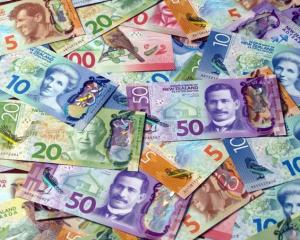The US Federal Reserve cut its monthly bond-buying programme - the sixth consecutive $US10 billion ($NZ11.76 billion) cut - from $US35 billion down to $US25 billion.
This week Argentina, South America's third-largest economy, defaulted for the second time in 12 years after the failure of last-ditch talks with hold-out, hedge fund, bond creditors.
In New York, the Dow Jones Industrial Average fell 1.9%, to 16,563.30, the S&P 500 shed 2%, to 1930.67 and the Nasdaq composite index 2.1%, to 4369.77.
In Europe and Asia, the Stoxx Europe 600 retreated 1.3%, the United Kingdom's FTSE 100 lost 0.6% and the MSCI Asia Pacific Index slipped 0.3%.
The Argentinian predicament, an end to a buoyant five-month US stock run and rising concerns in Portugal have investors spooked over a relapse in global economic recovery.
Craigs Investment Partners broker Peter McIntyre said the ''selective default'' by Argentina in not reaching an agreement over bond repayment kept investors ''in a downbeat mood''.
''The world is watching, they don't want the contagion to catch from Argentina ... no-one wants to see a major sovereign default,'' he said.
Unfolding geopolitical events in the Ukraine and Middle East were also unnerving investors, he said.
US stocks had ''tumbled'' on the last day of May, with the Dow Jones turning negative for the year, down 0.1% in 2014, to date.
''The S&P 500 and Dow industrial had their first down month since January,'' he said.
While the Fed's withdrawing of a further $US10 billion from the monthly stimulus package was expected by the markets, it raised the question of when US interest rates would start an upward move, he said.
''There was a raft of disappointing earnings reports from European heavyweights, which pushed the benchmark stock index to the lowest close since April,'' he said.
There was also another ''soft'' inflation reading from the euro zone, which offered little consolation to the markets, he said.
On opening yesterday, the Australian sharemarket was sharply down, both the benchmark S&P ASX200 index and broader All Ordinaries index down 1.18%..
Forsyth Barr broker Andrew Rooney said US shares had slumped amid weaker-than-expected corporate results, with declines in Exxon and Murphy Oil stocks driving energy companies to the biggest decline among 10 industries in the S&P 500 index.
European and UK stocks also sank, Adidas having slumped 15%, its biggest decline in 15 years, citing the Ukraine crisis would reduce profits from Russia.
Banco Espirito Santo plunged 42% on making provisions for a $US5.7 billion loss.
Shares in stricken Portuguese bank Banco Espirito Santo (BES) plunged 42% when trading was resumed after a suspension, dragging down the entire Lisbon stock market.
The market value of BES fell by nearly 1 billion ($NZ 1.57 billion) in a minute when the shares fell first by 51.01% to 0.17.
The collapse followed the bank's publication late on Wednesday of a first-half loss of 3.57 billion.
This was the biggest loss ever reported by a bank in Portugal, owing to exposure to the debts of its parent, Espirito Santo Group.
The bank is the biggest private bank in Portugal.
• Additional reporting: AFP












